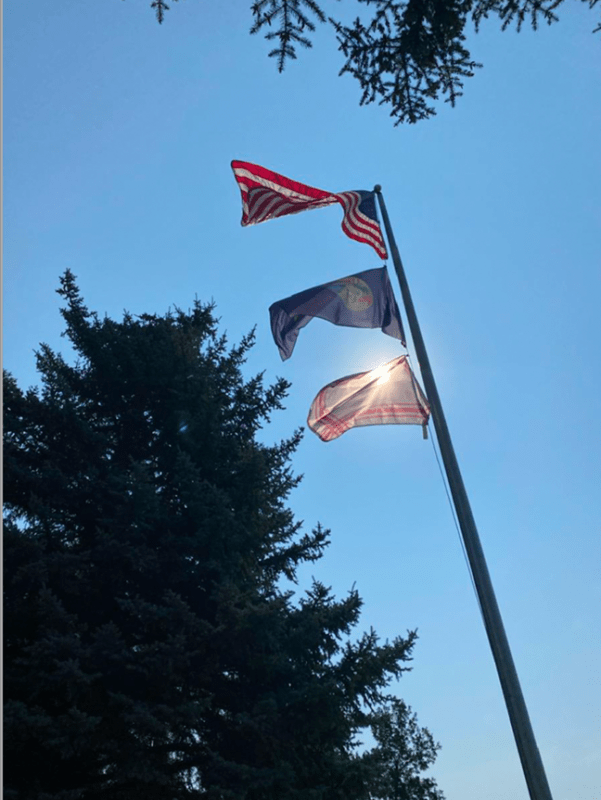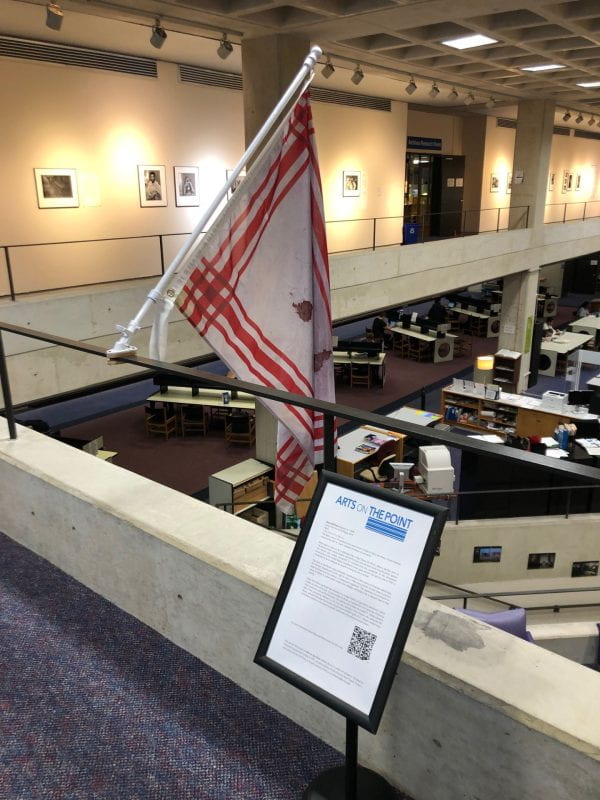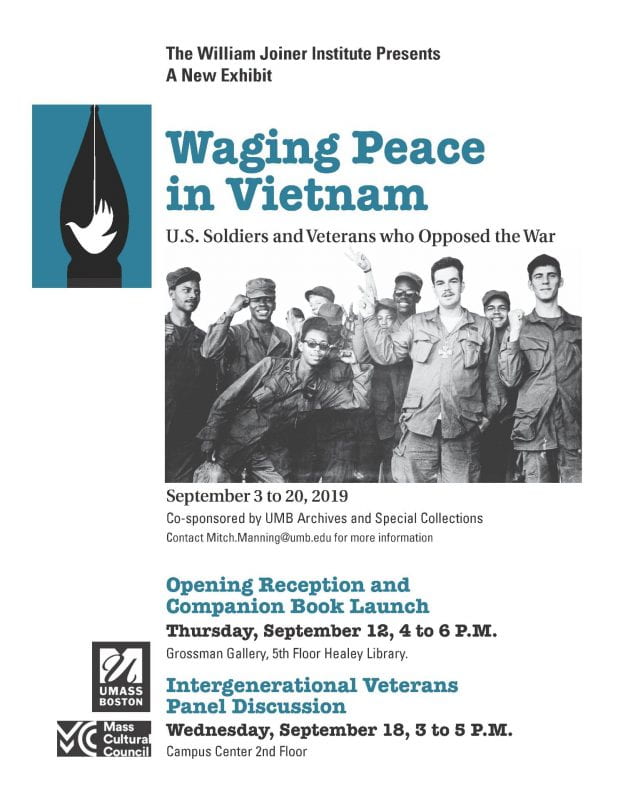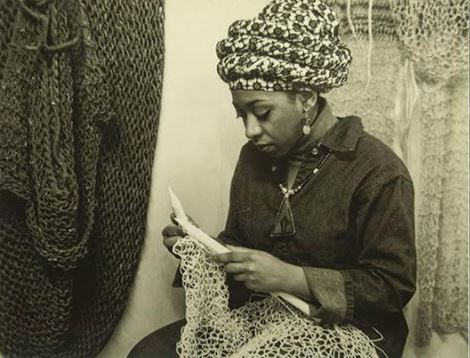Author: Prof. John Tyson, Art History
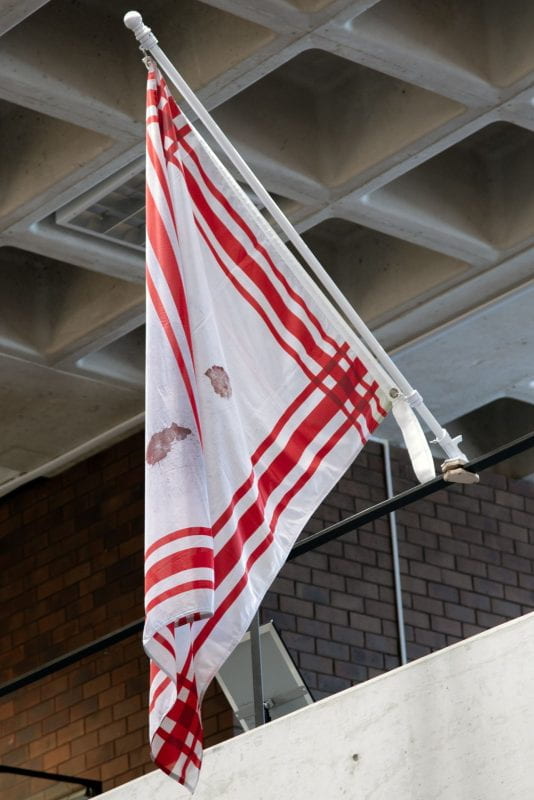
Letter from Home (Suffrage), 2019
Nylon
3.8 x 5.2 ft (117 x 150 cm)
Installation view, Grossmann Gallery, Healey Library, UMass Boston.
Copyright Elena del Rivero. Photograph by Jon Bakos.
Since the beginning of the semester, one of Elena del Rivero’s monstrous dishtowels, titled Letter from Home (Suffrage), has been on display in the Grossmann Gallery of the Joseph P. Healey Library at UMass Boston. Visible from the fourth and fifth floors of the library, the flag-artwork is presented on campus as part of the Arts on the Point public art program, directed by University Hall Gallery Director Sam Toabe. Del Rivero’s flag is one of nineteen with an identical design (in a range of different sizes) that have been, are, or will be flying across the United States. The number of flags references the Nineteenth Amendment to the United States Constitution, which legislated women’s right to vote in 1920. Del Rivero recognizes the de facto shortcomings of the change in legislation and the ongoing issues of enfranchisement with the stained forms on her work.
In addition to referencing American politics, Letter from Home (Suffrage) plants a flag in aesthetic territory. The dishtowel-banner alludes to a longer history of geometric abstraction within modern art and architecture. The grid of Letter from Home (Suffrage) recalls the basic structure of the Brutalist architecture of the Healey Library where it is installed; indeed, by this redoubling, it prompts illuminating reflections on the host site. Curiously, the library’s architect Harry Weese links our Columbia Point campus to the infrastructure of the District of Columbia.


Weese designed many of the Metro stations in the nation’s capital. Even as the dishtowel shares the geometries of these institutional structures, it markedly contrasts with the cold, rigid rationalism they communicate. In contradistinction, del Rivero’s use of a more humbly scaled, besmirched matrix tacitly advocates for a distinct logic: she celebrates human use and interaction with the grid.


Furthermore, throughout the twentieth century many male artists, from Piet Mondrian to Max Bill to Jasper Johns, were heralded as “geniuses” for their employment of the grid as a central motif. By translating and transposing the form of a gridded dishtowel into the realm of (public) art, del Rivero underscores the fact that textiles used primarily by women–and considered to fall in the lower category of “craft”—formally anticipate “groundbreaking” innovations of the avant-garde. Her flag labors to wrest the grid from the hands of male modernists and suggest it is an emblem of fluidity instead. Equally, the stains on the flag recall the marks and techniques of modernist painters like Jackson Pollock, Kenneth Noland, Morris Louis, and Helen Frankenthaler, who infused their canvases with thinned-down paint. Thus, del Rivero’s project subtly asks us to revise the history of visual and material culture: Letter from Home (Suffrage) posits a reconsideration of gender binaries as well as hierarchies of cultural production between “art” and “craft.”
Beyond para-citing the grids of modern architecture and art, del Rivero’s dishtowel design also recalls the geometric bands and fields of actual flags. Most flags are condensers of a collective political or civic identity. Indicative of the weight of flags as symbols, we even pledge allegiance to the Stars and Stripes. Hence, in some sense, del Rivero’s banners unite the 19 diverse locations where they have been shown in a constellation of feminist politics. They ask us to dream of a yet-to-fully-exist (and perhaps always utopian) feminist political polity—as well as a corresponding imagined community who would rally around its flag. Nevertheless, raising a feminine-coded banner implicitly issues real calls to action too. Letter from Home (Suffrage) can be read as a reminder that engagement in our domestic politics is an urgent matter—a fact that increasingly rings true following the June 24, 2022, overturning of Roe v. Wade (1973).
Thus, the artwork calls attention to our nation’s broader aesthetic and political context as well as the specific site where it hangs, prompting curious audiences to consider United States history and investigate UMass Boston’s histories, herstories, and their stories.
University Archives and Special Collections houses construction photographs of Healey Library and the Columbia Point campus. Substantial holdings documenting feminist politics in Boston and Massachusetts include:
- Betty Taymor papers
- Carol McEldowney papers
- Charlotte Golar Richie papers
- Christina Bobel: Our Bodies, Ourselves research collection
- Dolores Mitchell papers
- Elizabeth Bouvier collection of radical and leftist posters
- Jackie Jenkins-Scott papers
- Judith Smith collection of socialist feminist publications
- Massachusetts Women’s Political Caucus records
- UMass Boston Center for Women in Politics and Public Policy records
- UMass Boston Women’s, Gender, and Sexuality Studies Department records
- Women’s Action Coalition records
